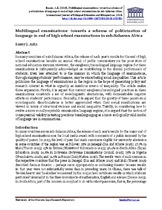Multilingual examinations: towards a schema of politicization of language in end of high school examinations in sub-Saharan Africa
Abstract
In many countries of sub-Saharan Africa, the release of each year’s results for the end of high school examinations heralds an annual ritual of public commentary on the poor state of national education systems. However, the exoglossic/monolingual language regime for these examinations is infrequently acknowledged as contributing to the dismal performance of students. Even less attended to is the manner in which the language of examinations, through shaping students’ performances, may be exacerbating social inequalities. This article politicizes the language of examinations in the region in the hope of generating policy and research interest in what is arguably an insidious source of inequality. The article makes three arguments. Firstly, it is argued that current exoglossic/monolingual practices in these examinations constitute a set of sociolinguistic aberrations, with demonstrable negative effects on students’ performance. Secondly, it is argued that the gravity of these paradoxical sociolinguistic disarticulations is better appreciated when their social ramifications are viewed in terms of structural violence and social inequality. Thirdly, in considering how to evolve a more socially equitable examination language regime, it is argued that the notion of consequential validity in testing positions translanguaging as a more ecologically valid model of language use in examinations.

